“Time after time, history demonstrates that when people don’t want to believe something, they have enormous skills of ignoring it altogether.”
~ Jim Butcher

1790 – American statesman, printer, scientist, and writer Benjamin Franklin died in Philadelphia at the age of 84.
He had been a delegate at the Continental Congress, and in 1776, he helped draft the Declaration of Independence. He succeeded in 1778 in securing two treaties that provided the Americans with significant military and economic aid, and in 1783, Franklin helped negotiate the Treaty of Paris with Britain, which officially ended the Revolutionary War and recognized American independence.
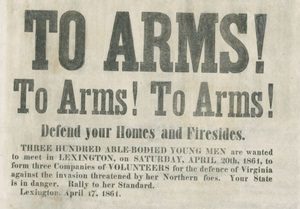
1864 – The state of Virginia’s secession convention voted to secede from the United States, becoming the 8th state to join the Confederate States of America. The following day, Union Colonel Robert E, Lee was offered a role as major general to command the defense of Washington by presidential advisor Francis P. Blair.
Lee replied: Mr. Blair, I look upon secession as anarchy. If I owned the four millions of slaves in the South I would sacrifice them all to the Union; but how can I draw my sword upon Virginia, my native state?
Although privately opposed to secession as “nothing but revolution and an unconstitutional betrayal of the efforts of the Founding Fathers,” Lee resigned his position three days later and took up command of the Virginia state forces.
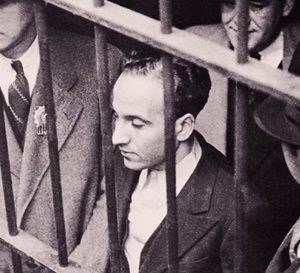
1936 – Settle in, this is going to take a while. After a week of tracking down every conceivable lead, police finally found the evidence they needed in order to break the case of Nancy Titterton’s rape-murder in New York City. Titterton had been raped and strangled on the morning of April 10. The only clues left behind were a foot-long piece of cord that had been used to tie Titterton’s hands and a horsehair – one solitary horsehair – found on her bedspread.
The cord was finally found to have come from Hanover Cordage Company in York, Pennsylvania. Company records showed that some of the distinctive cord had been sold to Theodore Kruger’s upholstery shop in New York City. Kruger and his assistant, John Fiorenza, were the first to discover Titterton’s body when they arrived to return a repaired couch which had been stuffed with horsehair that matched the one – remember that single horsehair? – found at the crime scene on the afternoon of April 10.
When investigators learned that Fiorenza had been at the Titterton house on April 9 and had been late for work the morning of the murder, they looked deeper into his background. Fiorenza had four prior arrests for theft and had been diagnosed as delusional by a prison psychiatrist.
Caught by surprise, Fiorenza confessed to the brutal crime but claimed that he was temporarily insane. This defense didn’t hold up too well at his trial. He was executed on January 22, 1937.
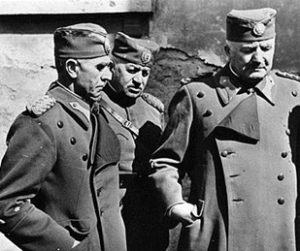
1941 – Representatives of Yugoslavia’s various regions signed an armistice with Nazi Germany at Belgrade, ending 11 days of futile resistance against the invading German Wehrmacht. More than 300,000 Yugoslav officers and soldiers were taken prisoner. Only 200 Germans died in the conquest of Yugoslavia.

1945 – U.S. Lieutenant Colonel Boris T. Pash commandeered over half a ton of uranium at Strassfut, Germany. Part of the reason was uranium was necessary for the development of atomic weapons, but even more important to the U.S. was preventing the Russians from stockpiling the uranium as they worked on their own atomic research plants in an attempt to develop an A-bomb.

1951 – Mickey Mantle made his major league debut for the New York Yankees in a 5-0 win over the Boston Red Sox. Baseball fans with sharp eyes will notice the future Hall of Fame outfielder was wearing #6 on his uniform.
He wore that number until July 15, 1951, when he was sent back to the Triple-A League Kansas City Blues. He was called back to the Yankees on August 24 that same year and was then assigned #7.

1960 – Rock star Eddie Cochran (Summertime Blues, C’mon Everybody, Twenty Flight Rock) died the day after a taxi carrying him from a show in Bristol, England, crashed en route to the airport in London. Cochran, who was thrown from the vehicle, suffered a severe head injury.
Gene Vincent (Be Bop A Lula), traveling with Cochran in the cab, suffered a broken leg and would walk with a limp for the rest of his life.
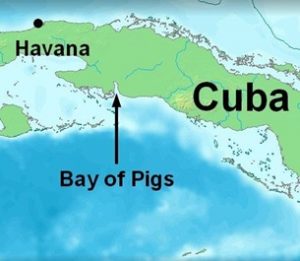
1961 – The Bay of Pigs invasion began when a CIA-financed and trained group of Cuban refugees landed in Cuba and attempted to topple the communist government of Fidel Castro. The attack was a complete failure.
Though many of his military advisers indicated that an amphibious assault on Cuba by a group of lightly armed exiles had little chance for success, President John F. Kennedy gave the go-ahead for the attack. 1,500 exiles, armed with American weapons and using American landing craft, waded ashore at the Bay of Pigs in Cuba.
The plan immediately fell apart when the landing force met unexpectedly rapid counterattacks from Castro’s military. The United States refrained from providing necessary air support. Over 100 of the attackers were killed, and more than 1,100 were captured.
The failure at the Bay of Pigs cost the United States dearly. Castro used the attack to solidify his power in Cuba and he requested additional Soviet military aid. Eventually that aid included missiles, and the construction of missile bases in Cuba sparked the Cuban Missile Crisis of October 1962, when the United States and the Soviet Union nearly came to blows over the issue.
Kennedy tried to redeem himself by publicly accepting blame for the attack and its subsequent failure, but the botched mission left the young president looking vulnerable and indecisive.
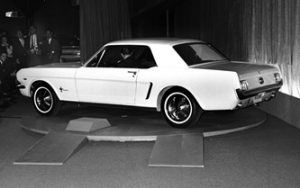
1964 – The Ford Mustang, a two-seat, mid-engine sports car, was officially unveiled by Henry Ford II at the World’s Fair in Flushing Meadows, New York. That same day, the new car also debuted in Ford showrooms across America and almost 22,000 Mustangs were immediately snapped up by buyers.
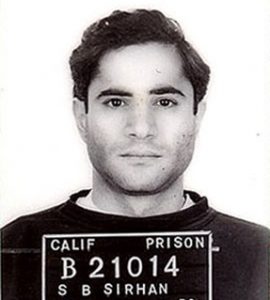
1969 – Sirhan Bishara Sirhan was convicted for the 1968 assassination of Sen. Robert Kennedy. Six days later, he was sentenced to death in the gas chamber. His sentence was commuted to life in prison in 1972 after California abolished the death penalty.
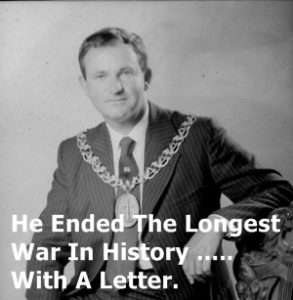
1986 – Netherlands & The Isles of Scilly (a series of small islands located off the southwest coast of Great Britain) signed a peace treaty. No one seemed to know or even care what started the war, but part of my job is researching these puzzles (at no charge to you) so here you go…
During the Second English Civil War (1648-1649), Britain was in turmoil due to infighting between the Parliamentarians and the Royalists, and because of that, lost control of the islands. Taking advantage of the Civil war, the islands started to harbor pirate ships, and those ships launched menacing attacks on Dutch merchant vessels (the lifeline of Dutch economy at that time).
In 1651, the Netherlands declared war on the islands and the Dutch Navy dispatched a fleet of 28 battleships against the tiny Isles of Scilly to capture the ports occupied by the pirates. However, before any shot was fired, the British government took back control of the islands and promised to resolve the pirate crisis and that pesky declaration of war.
They forgot to do that.
And so the war lasted, from decade to decade and century to century, until Roy Duncan (shown above), an historian and the Chairman of Isles of Scilly, wrote a letter to the Dutch Embassy in London, asking for peace. A quickly arranged treaty finally brought an official end to the War of 1651 … 335 years after it began.
Don’t you just love a war with no fatalities?
Compiled by Ray Lemire ©2018 RayLemire.com.
“Time after time, history demonstrates that when people don’t want to believe something, they have enormous skills of ignoring it altogether.”
~ Jim Butcher (Yup, what most republicans are doing these days)
Our first Mustang was 1967. One sweet car.
Nancy, Steve and you have always had sweet cars!